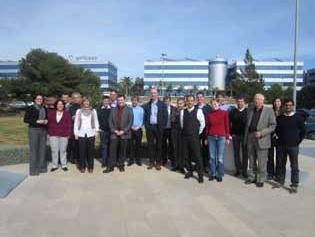To ensure a effective dispersion of nanoparticles, many processing variables must be monitored, for example residence time, liquid viscosity, local temperatures and pressure gradients as well as elongational stresses. Therefore it is not surprising that a sophisticated control system is required to govern such a multivariate process.
The most effective system to solve multivariate control problems in real time is termed Artificial Neural Network (ANN). An ANN mimics the mechanism operating in the human brain where uncountable mapped connections, to and from, biological neurons allow for retrieval of the most appropriate response to sensory stimuli. In NanoOnSpect ANN specialists are committed working to develop an expert system able to continuously generate the most appropriate operative response based on the selected signals emanating from the compounding process, on line.
Where conventional characterization methods are used, in which the nanocomposite is only characterized after the compounding step (for example using transmission electron microscopy and material testing), the finetuning of the compounding process becomes a laborious process of trial and error.
Furthermore, the dispersion process is very sensitive to process conditions, such as pressure, local shear stresses and other parameters, and it is difficult to produce nanocomposites with consistant quality.
With specific sensor technology, it is possible to receive data on the dispersion status of the nanocompound during production, data which can allow direct adaptive control.
Publications on NanoOnSpect
Online Raman spectroscopy for determination of CNT concentration in polymer/CNTcomposite V. Guschin, W. et al. Chops 2012 conference
Twin-screw extrusion of MWCNT reinforced polycarbonate composites: Investigation of electrical and mechanical properties. Mack C. et al, Fraunhofer ICT NanoStruc 2012 Conference



